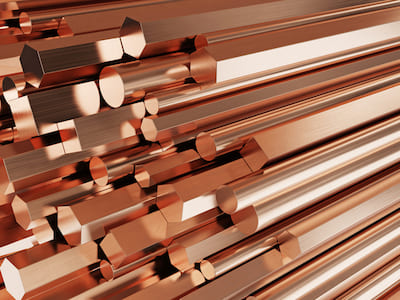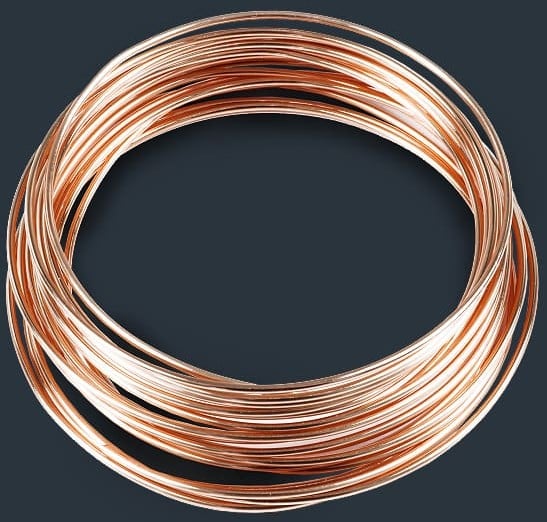Exploring the Diverse Applications of Copper Products in Modern Industries
Copper items have developed themselves as crucial elements throughout a myriad of contemporary sectors, mainly because of their amazing conductivity, malleability, and resistance to deterioration. From improving the performance of electric systems to playing an important role in renewable resource modern technologies, the flexibility of copper appears. Furthermore, its recyclability settings it as a sustainable option in production and electronics. As sectors progressively focus on development and sustainability, the varied applications of copper warrant a closer assessment, particularly regarding their possible effect on future ecological methods and technical developments.
Electric Applications of Copper
Copper is an essential material in the electric industry, accounting for roughly 60% of the overall need for non-ferrous metals worldwide - Copper Products. Its remarkable electric conductivity, which is virtually twice that of aluminum, makes it the preferred choice for a variety of electrical applications. From electrical wiring systems in business and domestic buildings to high-voltage power transmission lines, copper ensures performance and integrity in electrical energy shipment
In enhancement to electrical wiring, copper is important to the production of electric elements such as transformers, electric motors, and generators. These components utilize copper's thermal conductivity and pliability, necessary for warm dissipation and effective efficiency. Copper's resistance to rust enhances the lifespan and durability of electric systems, making it an affordable option in the lengthy term.
The development of sustainable power resources, such as solar and wind power, has additionally increased the need for copper in electric applications. As industries shift in the direction of lasting energy solutions, copper's role becomes also more vital. In general, the flexibility and performance qualities of copper solidify its standing as a cornerstone material within the electric sector, driving advancement and performance throughout numerous applications.
Pipes and Piping Solutions
In contemporary plumbing systems, the option of materials significantly impacts both capability and durability. Copper has emerged as a preferred choice as a result of its one-of-a-kind residential or commercial properties, including corrosion resistance and antimicrobial features. These features make sure that copper piping stays resilient and risk-free for delivering drinkable water, an essential consideration in household and industrial applications.
One of the vital advantages of copper in pipes is its capability to withstand heats and pressures, making it appropriate for a variety of applications, from warm water systems to heating and cooling networks. Furthermore, copper's flexibility enables easier setup in intricate piping layouts, minimizing the risk of leakages and failures.
Another noteworthy advantage is copper's long life expectancy, commonly surpassing 50 years with correct upkeep. This durability not just minimizes substitute prices yet additionally adds to lasting practices by decreasing waste. Copper's recyclability straightens with modern environmental requirements, advertising a circular economy within the pipes sector.
Copper in Renewable Resource
The flexibility of copper prolongs past pipes applications, playing a vital role in the renewable resource industry. Its exceptional electric and thermal conductivity makes it an important material in the manufacturing and distribution of renewable energy sources, specifically solar and wind power. In photovoltaic panels, copper is made use of in photovoltaic or pv cells and circuitry, facilitating efficient power learn the facts here now conversion and transmission. Its resistance to deterioration makes certain durable efficiency, which is important for taking full advantage of power outcome gradually.

Additionally, as the international need for electrical automobiles (EVs) boosts, copper's function in battery systems and charging facilities ends up being much more considerable. The product's capability to perform electrical power efficiently is integral to the performance of EV batteries, boosting variety and billing rate.
Copper's Function in Electronics
Electronics manufacturing depends greatly on copper's exceptional residential or commercial properties, particularly its high electric conductivity and thermal performance. These characteristics make copper a suitable option for a wide variety of digital parts, including ports, motherboard, and circuitry. The metal's ability to efficiently transfer electric signals makes certain very little power loss, which is crucial in high-performance digital gadgets.
Furthermore, copper's thermal conductivity plays a considerable function in warmth dissipation, shielding sensitive parts from overheating. This is particularly important in contemporary electronic devices, where compact layouts result in raised warm generation. Copper is additionally favored for its malleability and ductility, permitting it to be easily formed into complex styles that satisfy the needs of advanced digital applications.
With the rise of consumer electronics, telecommunications, and electrical cars, the need for copper in the electronics industry remains to grow. As innovations in technology progress, copper continues to be essential to attaining greater efficiency and reliability in electronic items. Its recyclability better enhances its charm, as makers seek lasting remedies without compromising high quality. Hence, copper remains a keystone product in the ever-expanding field of electronics.
Cutting-edge Utilizes in Manufacturing

One click resources significant application remains in additive manufacturing, where copper-based products are employed in 3D printing procedures. This enables for the production of lightweight parts and complex geometries, specifically in the aerospace and vehicle fields. In addition, copper's thermal conductivity makes it a suitable choice for warm exchangers, improving effectiveness in industrial cooling systems.
Moreover, the increase of smart manufacturing has actually seen the incorporation of copper in IoT tools, where its conductive capabilities sustain advanced picking up innovations. In the world of renewable energy, copper is essential in the manufacturing of photovoltaic panels and wind turbines, assisting in more effective power conversion and circulation.
As sectors pursue sustainability and development, copper's adaptability and efficiency remain to place it as a critical product, driving developments in production and contributing to the development of smarter, extra effective items.
Final Thought
The indispensable duty of copper in eco-friendly energy and its vital feature in electronics underscore its relevance in progressing lasting methods. Collectively, these applications highlight copper's essential contribution to technical progression and industrial efficiency in modern society.
From enhancing the efficiency of electric systems to playing a critical function in renewable power modern technologies, the flexibility of copper is noticeable. As markets increasingly focus on technology and sustainability, the diverse applications of copper require a closer examination, specifically regarding their potential effect on future ecological practices and technical developments.
The development of renewable energy sources, such as solar and wind power, has actually further boosted the demand for copper in electric applications. Overall, the convenience and efficiency features of copper solidify its standing as a cornerstone product within the electric field, driving advancement and effectiveness across different applications.
The versatility of copper prolongs past plumbing applications, playing a crucial duty in the eco-friendly power field.